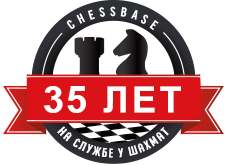Войти
Войти
Создать аккаунт
Новый пользователь? Создайте свой аккаунт и вы сможете покупать продукты ChessBase, видеть ваши заказы, получать новости и участвовать в жизни сайта.
A59
Код энциклопедии шахматных дебютов (ЭШД)Описание
RU: Волжский гамбит: 7. e4
EN: Benko/Volga Gambit: White castles by hand
Ходы
1. d4 Кf6 2. c4 c5 3. d5 b5 4. c:b5 a6 5. b:a6 С:a6 6. Кc3 d6 7. e4
Дебюты
































































Партии PGN
































































Akobian, Varuzhan -
Gurevich, Dmitry
1/2-1/2
Ссылка
USA-ch
,
29.11.2004
1. d4 Кf6 2. c4 c5 3. d5 b5 4. cb5 a6 5. ba6 g6 6. Кc3 Сa6 7. e4 Сf1 8. Крf1 d6 9. Кf3 Сg7 10. g3 O-O 11. Крg2 Кbd7 12. h3 Фa5 Black chooses the
classical Volga move instead of the topical modern line [12... Лa6 13. Лe1 Фa8 /\e6<=>] 13. Лe1 Лfb8 14. Фc2 Seirawan,Y (2600)-Polgar,J (2550)
Roquebrune rapid 1992 (7) 1/2 A rare move, which however goes contrary to
White's idea of putting both his R on the 2-nd rank and effectively defending
a2 after a further b3. A typical model example is [The main alternative, which promises chances for an edge, is 14. Лe2 Кe8 15. Лc2 Кb6 16. Фe2 Фa6 (16... Кa4 $142 17. Кd1!? У белых небольшое преимущество) 17. Фa6 (17. Кg1 Кa4 18. Фa6 Лa6 19. Кge2 Кc7 20. a3 f5 21. f3 fe4 22. fe4 Кc3 23. Кc3 Кb5 24. Кb5 Лb5 У белых достаточная компенсация за материал Beliavsky, A-Khalifman,A/Linares/1995/) 17... Лa6 18. Лb1! Кa4?! 19. Кd1 Кc7 20. b3 f5 21. Кd2! Кb6 22. b4 Кd7 23. bc5 Лb1 24. Кb1 Кc5 25. Сe3 Явное преимущество у белых Neverov, V-Van der Weide,K/Hoogeveen/1999/] [Another often played continuation is 14. e5 de5 15. Кe5 Кe5 16. Лe5 Лb7 17. d6 (17. Фf3 Кe8 18. Лe2 Кd6 19. g4 Кc4!? 20. d6 Кd6 21. Кd5 Лaa7 22. Сg5 Bekker Jensen,D-Van der Weide,K/ Copenhagen/1999/ 22... Кc8!? шансы равны, спокойная позиция) 17... ed6 (17... e6 18. Лe2 (18. Фf3!?) 18... Фa6 19. Сf4 Фc6 20. Крg1 Кd5 21. Кd5 ed5 22. b3 Сf8 23. Лd2 d4 24. Лc1 Фd5 25. Лdc2 Сd6 26. Сd6 Фd6 шансы равны, спокойная позиция Shirov,A-Tregubov,P/FRA-chT Montpellier/2004/) 18. Фd6 Лc8! 19. Кd5 Кd5 20. Фd5 Фa6 21. Лe4 c4 22. Сf4 Сb2 23. Лae1 Фb5 24. Лe8 Лe8 25. Фb5 Лb5 26. Лe8 Крg7 27. Лc8 Лb4 28. Сd6 Лa4 29. a3 Крf6 30. Сb4 Сa3 шансы равны, спокойная позиция 1/2,Piket,J-Topalov,V/Amsterdam/1995/] 14... Кb6 15. Лb1 This gives White nothing. [15. Сd2 Кc4 16. b3 Кd2 17. Кd2 Кd7 18. Лe3 Кb6 19. a3 Лb7 (19... e6!? У белых контригра) 20. Лa2 Лba7 21. Кcb1 Крh8 22. Лf3 e6 23. Кc4 Кc4 24. Фc4 Фe1 25. Фc2 ed5 26. Лe3 Фa5 27. ed5 Сd4 28. Лe2 Фb6 29. a4 Лb8 30. Кd2 У белых небольшое преимущество Haba,P-Hess,M/Hohenloh/1994/] [15. Кd1 c4 16. Сd2 Фa4 17. Фc1 Кbd7 18. Лe3 Кc5 19. Лa3 Фb5 20. Лa8 Лa8 21. Кc3 Фb7 22. Фc2 e6 У белых достаточная компенсация за материал 1/2,Uhlmann, W-Espig,L/Dresden/1985/] [15. Лe2!? Кa4 (15... Кfd7!?) 16. Кd1 Кd7 17. Лb1 c4!? 18. Сe3 (18. Фc4 $142 18... Лc8 19. b4! У белых небольшое преимущество) 18... Кac5 19. Сd4?! Фa2 20. Сg7 Крg7 21. Кc3 Фa6 22. Фd2 Кb3 23. Фf4 f6 У черных небольшое преимущество Gurevich,M-Benjamin,J/Cap d'Agde/2000/] 15... Кfd7 16. Сg5 Кc4 $146 [Simpler was 16... Сc3 $142 !? 17. bc3 (17. Фc3 $142 17... f6! шансы равны, спокойная позиция) 17... f6 18. Сh6 (18. Сe3 Фa2 19. Лb2 Фa4 20. Фa4 Кa4 21. Лb8 Лb8 С инициативой у белых) 18... Фa2 19. Лb2 Фa4 20. Фe2 Кc4 21. Лbb1 (21. Лb8 Лb8 22. Кd2 шансы равны, спокойная позиция) 21... Кce5 22. Кe5 Кe5 23. Сf4 Лb1 24. Лb1 Фc4 25. Фc4 Кc4 26. h4 h5 27. Лb7 Крf7 28. Крf3 Лa3 29. Лb8 Лc3 30. Крg2 Крg7 (30... e5!? У черных небольшое преимущество) 31. Лb7 Крf8 32. Сh6 Крe8 33. Лb8 Крd7 34. Лb7 Крe8 35. Лb8 Крd7 36. Лb7 1/2,Anastasian,A-Alterman,B/Komotini op/1992/] 17. Сe7 Лe8! [17... Кb2? 18. e5! Кc4 19. Лb8 Лb8 20. Лe4 Кdb6 (20... Кde5 21. Кe5 Кa3 22. Фa4! У белых решающее преимущество) (20... Лb2 21. Фc1 Фa3 22. Сg5! Кce5 23. Лa4) (20... Кa3 21. Фa4 (21. Фc1!?) 21... Фc3 22. Фd7 У белых решающее преимущество) 21. Кa4 Явное преимущество у белых] [17... Лb2? 18. Лb2 Кb2 19. e5 Явное преимущество у белых] 18. Сg5 [18. Кd1 Фa2 19. Лc1 необычный ход (19. Сg5? Кa3 У черных решающее преимущество) 19... Сb2 20. Кb2 Фb2 21. Фc4 (21. Фb2 Кb2 22. Сd6 Кd3 У черных небольшое преимущество) 21... Лe7 шансы равны, спокойная позиция] 18... Кb2 19. e5 Leads to tactical complications, which after
some mutual inaccuracies peter out into a drawn position. [19. Сd2 Кc4 У белых достаточная компенсация за материал] [More ambitious was 19. Лec1 $142 !? 19... Кc4 20. Кb5 Кa3 21. Кa3 Фa3 22. Сf4 У белых небольшое преимущество] 19... Кe5 20. Кe5 [20. Лb2 Кf3 21. Лe8 Лe8 22. Крf3 Сc3 У черных небольшое преимущество] 20... Лe5 [20... Сe5 21. Лe5 Лe5 22. Сf4 Кc4 23. Кb5! С инициативой у белых] 21. Кe4? [21. Лe5 $142 21... Сe5 22. Кe4!? Фa4!? У белых контригра (22... Фa2 23. Сf6 Фa4!? шансы равны, спокойная позиция (23... Фd5? 24. Сe5 de5 25. f3! У белых решающее преимущество))] 21... Фa2! 22. Сf4?! [22. Лb2 Фd5 /\Re4,Rg5 23. f3 Лe4! (23... Лg5 24. Лd1 Фf5 25. Лa2 Лa2 26. Фa2 У белых небольшое преимущество /\h4+-) 24. fe4 Фg5 С инициативой у белых] [22. Сf6 Лe4 23. Лb2 Фd5 (23... Фb2? 24. Сb2 Лe1 25. Сg7 У белых решающее преимущество) (23... Лe1 24. Лa2 Лa2 25. Фa2 Сf6 шансы равны, спокойная позиция) 24. Фe4 Фe4 25. Лe4 Сf6 У черных небольшое преимущество] 22... Лee8! [22... Лd5 23. Лa1! Фa1 24. Лa1 Лa1 25. Фb3! У белых решающее преимущество] 23. Сd6 Фd5? [23... f5! 24. Кc3 (24. Лa1 Фd5 25. Фc5 Фb7 У черных решающее преимущество) 24... Сc3 25. Фc3 Фd5 Явное преимущество у черных] 24. Фc5 шансы равны, спокойная позиция 24... Фd3 [24... Фb7 25. Фc7 шансы равны, спокойная позиция] 25. Фc6! /\Nf6 25... Лec8 26. Лa1 Лab8 необычный ход [26... Лc6? 27. Лa8 Сf8 28. Сf8 h6 29. Сa3 Крh7 30. Сb2 У белых решающее преимущество] 27. Фd7 Фd5 [27... Лd8 шансы равны, спокойная позиция] 28. Крh2 [28. Лa7 Лd8 29. Фe7 Лe8 шансы равны, спокойная позиция] 28... Фb7



